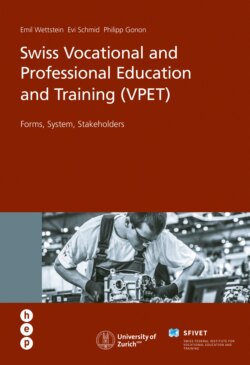Читать книгу Swiss Vocational and Professional Education and Training (VPET) - Philipp Gonon, Emil Wettstein - Страница 39
На сайте Литреса книга снята с продажи.
ОглавлениеPORTRAIT OF SERKAN KIZILTOPRAK
Serkan Kiziltoprak, 33,
is attending a professional college and studying for an Advanced Federal Diploma of Higher Education in Engineering, Specialisation: Architecture (Techniker HF Fachrichtung Architektur)
clear
Career in construction
Serkan Kiziltoprak has burdened himself with quite a lot. He works almost full-time in an architect’s office and attends a part-time course at a professional college to prepare for his activity as a construction supervisor. He explains:
“At first, I admit, it was not easy. At the age of 31, I went back to school, for three to four hours on two evenings a week, and also for half a day on Saturdays, involving 1,800 contact hours in seven semesters! I am working for an Advanced Federal Diploma of Higher Education in Engineering with a specialisation in architecture (Techniker HF Architektur) at the Gewerblich-Industrielle Berufsschule Bern gibb (VET School/Professional College Berne). Not that the lessons were boring. But it was hard for me to motivate myself again in the evening after a full day’s work in an architect’s office.
These difficulties have long been overcome, five out of seven semesters are behind me. Knowing that, with this training, I am acquiring the foundations for even more interesting work has helped me, as has the prospect of having my salary increased by 1,000 to 2,000 Swiss francs. The benefit of this training could already be seen when I moved here to Berne a year ago. I had sent off five unsolicited applications, and three offices would have employed me! It is also great that my employer pays half of the training costs, which amount to around 17, 000 Swiss francs. In return, I have committed myself to the company for at least three years. I also have more responsibility. In my original profession as a construction designer, I mainly had an implementing role. Now, I take part in meetings with construction specialists – construction physicists or ventilation specialists, for example.
The training is divided into 44 modules taught by various lecturers. Each module is completed with two or three competence records, some in the form of individual or group projects. Recently, we received plans for a reconstruction, the costs of which we had to calculate in the form of an estimate according to the Schweizerischer Ingenieur- und Architektenverein SIA (Swiss Society of Engineers and Architects). Such costing is part of the area of responsibility of an engineer. In the “Design” module, we had to develop a two-storey building with an area of 260 square metres. Here, I also had to deal with new tasks: where should I place the building in the perimeter, what ideas did I have for the floor plan? As an engineer I will not be drawing any buildings – this remains the task of architecture – but in construction planning, we are links between the clients, the authorities, planners and the companies carrying out the work. Here, it is good to know the tasks and the language of all the specialists involved in the construction. With topics such as marketing, supply and waste disposal and accounting, this field of knowledge is very extensive.
The programme consists of classroom teaching with teacher-centred phases, case studies, projects, private study and excursions. In didactic terms, learning and teaching at the gibb professional college according to the new core syllabus is based on the concept of “action-oriented learning”. This means practical orientation. In the third and fifth semesters, for example, we write the semester papers entirely independently. We are currently planning a building which will have an exhibition room and a sales shop and has to meet the Minergie standard P-Eco. We have to provide the energy analysis, calculate the costs of the construction project and develop the plans for the project description and the building application. Normally I study for around one hour a day, but this project requires much more time! If the time burden were too great, I could extend my study duration. It is possible to spread the seven semesters out over a study duration of twelve semesters.
Apart from the classroom, there are no other learning locations. Only people who are employed for at least 50 per cent of the time in the professional field can take part in the training, so a traineeship is not necessary; this is different in other study programmes at professional colleges. Apart from employment, attendance of a one-semester preliminary course is also required. In this course, the subjects mathematics, German and English are taught. The preliminary course is mainly a preparation for the study programme; people with a Federal Vocational Baccalaureate are exempt from this. Finally, guest students can also take part in individual modules. Two learners from a VET programme have each attended such a module. They should be advised to stick to it. Because starting learning again is not as hard for them as it is for me!”
